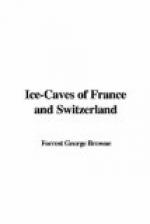The culinary monk knew nothing of the history of his convent, beyond the bare year of its foundation, and displayed a monotonous dead level of ignorance on all topographical and historical questions: to him the Pain d’Abbaye[38] meant nothing further than the staff of life there provided, and he neither knew himself nor could recommend any Brother who knew anything about the glaciere. He was a German, and we talked of his native Baiern and the modern glories of his capital; and when his questions elicited a declaration of my profession, he passed up to Saxony, and pinned me with Luther. Finding that I objected to being so pinned, and repudiated something of that which his charge involved, he waived Luther, of whom he knew nothing beyond his name, and came down upon me triumphantly with the word Protestant. I explained to him, of course, that the worthy Elector, and his friends who protested, had not much to do with the Anglican branch of the Church Catholic; and then the old task had to be gone through of assuring the assembled Brothers that we in England have Sacraments, have Orders, have a Trinitarian Creed.
At length, about half-past three, we started for Besancon, paying of course a volonte for food and entertainment, as we did not choose to qualify as paupers. The driver told me on the way that there was another glaciere at Vaise, a village three or four kilometres from Besancon, and at no great distance from the road by which we should approach the town; so, when we reached the crest above Morre, where the road passes the final ridge by means of a tunnel, I paid the carriage off, and walked to the village of Vaise. The public-house knew of the glaciere—knew indeed of two,—further still, kept the keys of both. This was good news, though the idea of keys in connection with an ice-cave was rather strange; and I proposed to organise an expedition at once to the glacieres. The male half of the auberge declared that he was forbidden to open them to strangers, except by special order from a certain monsieur in Besancon; but the female half, scenting centimes, stated her belief that the monsieur in Besancon could never wish them to turn away a stranger who had come so many kilometres through the dust to see the ice. She put the proposed disobedience in so persuasive and Christian a form, that I was obliged to take the husband’s side,—not that he was in any need of support, for he had been longer married than Adam was, and showed no signs of giving way. It turned out, after all, that though there was no doubt about the existence of the glacieres, there was equally no doubt that they were glacieres artificielles, being simply ice-houses dug in the side of a hill, and the property of a glacier in Besancon; so that my friend the driver had sent me to a mare’s-nest.




